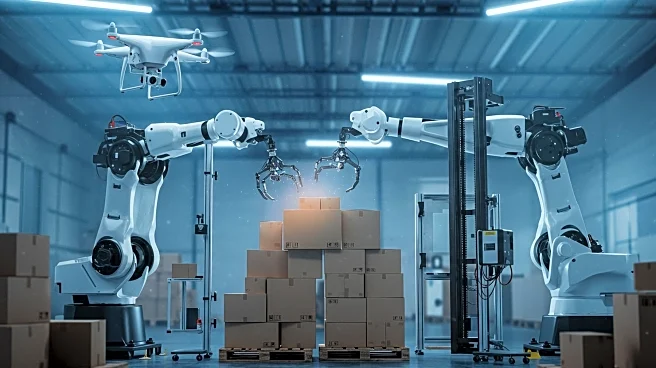What's Happening?
Warehouse automation is undergoing significant transformation due to emerging technologies that enhance operational speed, precision, and adaptability. Driven by the growth of e-commerce and the need for cost efficiency, companies are integrating advanced systems into their facilities. Autonomous Mobile Robots (AMRs) are playing a pivotal role by providing flexible movement of goods, adapting to changes, and coordinating with other automated tools. These robots improve labor efficiency by taking over repetitive tasks, allowing staff to focus on higher-value responsibilities. Additionally, IoT and sensor integration are enabling warehouses to collect and share data, supporting predictive maintenance and improving visibility for managers. AI-powered inventory management is enhancing demand forecasting, real-time tracking, and optimized stock placement, while cloud-enabled Warehouse Management Systems (WMS) offer centralized access to data, scalability, and advanced analytics.
Why It's Important?
The integration of these technologies is crucial for modernizing warehouse operations and meeting the demands of global supply chains. By adopting automation solutions like AMRs, IoT, AI, and cloud-based WMS, businesses can reduce costs, improve accuracy, and accelerate order fulfillment. These advancements not only streamline processes but also set the stage for smarter and more resilient operations. Companies that embrace these innovations will be better equipped to handle the challenges posed by rising consumer expectations and rapid market changes. The shift towards data-driven environments allows for real-time adjustments and improved resource allocation, ultimately enhancing productivity and reducing waste.
What's Next?
As these technologies continue to evolve, warehouses are expected to further integrate automation solutions to enhance efficiency and performance. Businesses may gradually increase the deployment of AMRs and expand IoT and AI capabilities to optimize operations. The scalability of cloud-based WMS platforms will support growth and seasonal peaks without major hardware investments. Companies will likely focus on refining these systems to maximize their benefits, ensuring they remain competitive in the fast-paced e-commerce landscape. Continuous innovation in warehouse automation will drive further improvements in supply chain management and customer satisfaction.
Beyond the Headlines
The adoption of advanced warehouse technologies raises ethical and cultural considerations, particularly regarding workforce dynamics. As automation takes over repetitive tasks, there may be shifts in employment patterns, requiring workers to adapt to new roles focused on oversight and quality control. Additionally, the reliance on data-driven systems emphasizes the importance of cybersecurity and data privacy, as warehouses handle sensitive information. Long-term, these technologies could lead to a redefinition of warehouse spaces, transforming them into hubs of innovation and efficiency.









